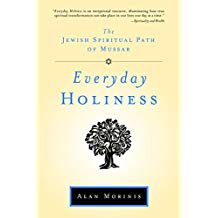Everyday Holiness: The Jewish Spiritual Path of Mussar, Alan Morinis 2007
Morinis, the founder of the Mussar Institute, has written an excellent guide to the Mussar approach, a Jewish path of character development and spiritual growth leading to awareness, wisdom, and transformation. The book is Jewish in two major ways. First, it draws heavily on sages and Rabbis of the past who have written about Mussar at least back to the 15th C. Second, and perhaps most challenging for me, it anchors the goal of spiritual growth and transformation in Yirah, defined as a combination of fear and awe. Fear refers to the risk of eternal punishment in the afterlife, and awe refers to the feeling upon contemplating God and God’s handiwork in the world. Absent that religious foundation, the book is a superb addition to my meditation reading. It begins by outlining the soul’s traits that have both a positive and a negative element, the balance between the yetzer ha’ra (the evil twin) and yetzer tov (the good twin). Mussar assumes that all of us have both elements in each of the 18 soul traits whose positive elements are humility, patience, gratitude, compassion, order, equanimity, honor, simplicity, enthusiasm, silence, generosity, truth, moderation, loving-kindness, responsibility, trust, faith, and Yirah. Morinis recommends a set of specific practices that are designed to move the practitioner in the life-long path of spiritual growth—identifying areas for improvement, daily noting of behavior in the area chosen for a one month focus, text study, and working with a partner or group. There is much overlap with traditional mindfulness, though the emphasis on improvement in Mussar is quite different from the acceptance and lack of judgment that mindfulness stresses. This is a fine book which will stimulate self-assessment and further the work of mindfulness with a deeper emphasis on one’s inner self (?the soul) and its external manifestations, i.e. behavior and engagement with the world.



